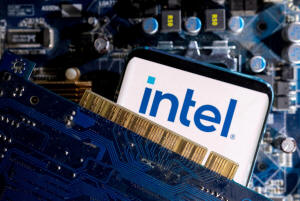|
The
U.S. chipmaker last year announced plans to build a big chip
complex in Germany along with facilities in Ireland and France
as it seeks to benefit from European Commission's eased funding
rules and subsidies as the EU looks to cut its dependence on
U.S. and Asian supply.
The facility in Poland will employ 2,000 workers and create
several thousand additional jobs during the construction phase
and hiring by suppliers, the company said in a statement.
"Poland was just a little bit hungrier to win this site," Chief
Executive Pat Gelsinger said in a news conference.
Several countries have been vying to get Intel to invest in
their regions and some, like Germany, who have secured a
commitment from Intel, have been in talks on the amount of
subsidies they can doll out.
Handelsblatt newspaper reported on Thursday that the German
government and Intel were close to an agreement for 9.9 billion
euros ($10.83 billion) in subsidies, up from a previously agreed
6.8 billion.
The level of any subsidy offered to Intel by Poland was not made
public during Friday's announcement.
Design and planning for the facility will begin immediately,
with construction to commence pending European Commission
approval.
Mateusz Morawiecki, prime minister of Poland, called Intel's
factory "the largest greenfield investment in the history of
Poland".
The company, which has been in the country for 30 years and
employs 4,000 workers, said it chose Poland because of its
infrastructure, available talent and noted the site is close to
its planned factory in Germany and its site in Ireland.
It expects the facility to come online by 2027.
Intel under CEO Pat Gelsinger has been investing billions in
building factories across three continents to restore its
dominance in chip making and better compete with rivals AMD,
Nvidia and Samsung.
Intel also has plans to invest up to $100 billion to build
potentially the world's largest chip-making complex in the U.S.
state of Ohio.
(Reporting by Karol Badohal in Wroclaw, Poland, and Supantha
Mukherjee in Stockholm; editing by Jason Neely and Conor
Humphries)
[© 2023 Thomson Reuters. All rights
reserved.]
This material may not be published,
broadcast, rewritten or redistributed.
Thompson Reuters is solely responsible for this content.

|
|




